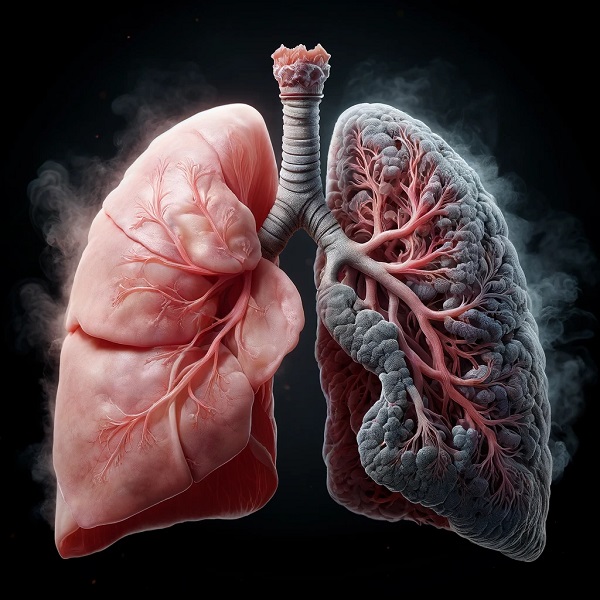
Coping with Emphysema
Kay
- 0
What is Emphysema?
Emphysema is a chronic lung condition characterized by damage to the tiny sacs (alveoli) in the lungs. Emphysema is a form of Chronic Obstructive Pulmonary Disease (COPD), an umbrella term for lung diseases where breathing is hindered. In emphysema, the condition causes difficulties exhaling air from the lungs. Breathing tends to become difficult, resulting in disability and reduced quality of life.
Understanding Emphysema
How Emphysema Affects Your Lungs
As you inhale, air moves down your trachea (windpipe) into smaller and smaller tubes called bronchioles, terminating in a collection of hundreds of millions of tiny air sacs called alveoli. It is here, where exchange of gases occurs, that the inhaled oxygen enters your blood and carbon dioxide is exhaled, for waste elimination. However, if partitions separating individual alveoli of people with emphysema collapse, the remaining alveoli become larger but fewer in number. This decreases the surface areas available for exchange, which causes the body to receive less oxygen than normal.
Causes
Smoking: The Leading Cause
Smoking represents far and away the greatest risk factor for emphysema: the toxins in smoke destroy the air sacs as well the airways, and are responsible for the onset and progression of the disease in most cases. Prolonged exposure to tobacco smoke is the most common cause of emphysema.
Other Risk Factors
Other causes of the lung damage underlying emphysema include long-term exposure to air pollutants, industrial dusts and fumes in the workplace and environmental tobacco smoke (ETS), or secondhand smoke. A genetic syndrome called Alpha-1 Antitrypsin Deficiency can also predispose people to develop emphysema.
Common Signs of Emphysema
Emphysema symptoms can vary, but can include being short of breath (esp. at rest or with physical exercise), a chronic (long-lasting) cough and wheezing. As the illness progresses, these symptoms and disability can get worse.
How to Identify Early Symptoms
Because the symptoms of emphysema might develop slowly, early detection can be challenging. If you have persistent shortness of breath, a cough that won’t go away, or are receiving frequent treatments for respiratory infections, see your healthcare provider for further discussion.
Diagnosis
Tests and Procedures
Like with a number of other diseases, emphysema is diagnosed through medical history, physical examination and tests. Pulmonary function tests (PFTs) evaluate how well your lungs are working and, in some cases, the extent of damage. Imaging tests like a chest X-ray or a CT scan show changes in the lungs; and blood tests often measure the amount of oxygen and carbon dioxide in what we breathe.
When to See a Doctor
However, if you have symptoms that persist or recur and you are confident they are not one of these things, please present to a doctor for advice. Early diagnosis and early intervention can really help with managing symptoms and slowing progression. Early diagnosis and early intervention can really help with managing symptoms and slowing progression.
Treatment Options
Lifestyle Changes
There are some lifestyle changes that can greatly improve living with emphysema. Even after the lungs are damaged, the best thing you can do is quit smoking. Any air pollutants should also be avoided and a healthy diet is always helpful.
Medications
There are different medications that might be prescribed to help treat the symptoms of emphysema. Bronchodilators may be prescribed, for example, to help relax the muscles that surround the airways and enable them to stretch open further. Another medication that might be prescribed for a patient with emphysema is an inhaled steroid, which will work to help to reduce inflammation. Antibiotics might be prescribed to treat respiratory infections.
Pulmonary Rehabilitation
Pulmonary rehabilitation programmes help people with lung conditions such as emphysema. They often include: Exercise training, to build strength and stamina Nutritional counselling, to improve breathing and diagnose problems Education about managing the disease, to help you stay fit and happy. Pulmonary rehab can boost your ability to get through daily tasks and exercise.
Surgical Treatments
Patients with the more severe form of emphysema might consider surgical options like lung volume reduction surgery (LVRS) – in which the doctor removes damaged lung tissue – or a lung transplant. Both procedures can improve breathing and lung function in select patients.
Living with Emphysema
Daily Management Tips
Controlling emphysema day today involves proper use of medicine, changes in lifestyle and monitoring of general wellbeing. Use your medication. Visit your doctor. Get your exercise.
Nutrition and Exercise
Maintaining a healthy and balanced diet and physical activity is useful for controlling the symptoms of emphysema. Eating healthy foods is beneficial for your general well-being. Engaging in physical activity, such as breathing exercise, helps you to strengthen the muscles related to breathing and improve your endurance.
Support and Resources
Having emphysema can be difficult, but you don’t have to do it alone. Joining a support group and speaking with a counsellor can keep you informed and emotionally supported while an online community can be a great resource and connect you with people who understand what you’re going through.
Prevention
Quitting Smoking
The best way to prevent emphysema is to quit smoking. If you are a smoker, help to quit will lower your risk of developing this disease. Help could come from counselling, prescription drugs, self-help materials and support groups.
Reducing Exposure to Pollutants
Exposure to air pollution, occupational dust and chemicals can also lead to emphysema. As far as possible, try to avoid harmful exposures at work and in your living and leisure spaces by taking simple precautions such as wearing protective gear at the workplace and ensuring adequate ventilation at home.
Conclusion
Final Thoughts on Emphysema
If you have emphysema, your course of treatment is likely to involve constant monitoring in combination with lifestyle changes that might include a change in your occupation. Although there is no cure, quitting smoking and staying vigilant about potential flare-ups can help you live a fulfilling life. Do not wait for anything. Go for regular checkups, ask your physician for advice, and develop a good sense of self-care.
FAQs
Can emphysema be reversed?
No, the damage is irreversible as the air sacs have ceased to function. But you can control symptoms and live a good quality of life through treatment and lifestyle changes.
How does smoking cessation impact emphysema?
Oxymoron quit-smoking is the most essential thing of controlling emphysema but it can help terribly to stop from further lung ailing and holds back the traveling of the disease that causes to sore and not well conditions of the lungs.
Is emphysema the same as chronic bronchitis?
I think that emphysema and chronic bronchitis are one in the same, but they are not. Both emphysema and chronic bronchitis are forms of COPD, but emphysema is caused by damage to the air sacs in your lungs, while chronic bronchitis is caused by inflammation of the bronchial tubes leading to your lungs and excessive mucous production.
Can exercise help with emphysema?
Yes. Regular exercise, including pulmonary rehabilitation exercises, can strengthen the muscles used in breathing, expand one’s ability to take in oxygen and boost overall endurance and energy.
What are the surgical options for severe emphysema?
Another option is to perform either a lung volume reduction surgery (LVRS) or a lung transplant. By doing so, patients who are carefully selected will have better lung function and quality of life.
LG K40 LG Velvet Samsung Galaxy Z Fold2 Samsung Galaxy Z Fold2 LG V60 ThinQ LG K40 Samsung Galaxy A51 Samsung Note 20 iPhone XR LG V60 ThinQ


